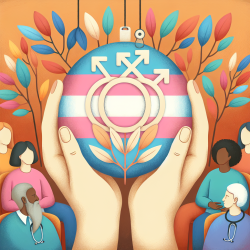The growing population of transgender older adults highlights the urgent need for respectful and inclusive end-of-life (EOL) care. A recent study titled "End-of-Life Care for Transgender Older Adults" explores this critical issue, offering valuable insights and recommendations for healthcare practitioners.
Understanding the Challenges
Transgender older adults often face discrimination, inadequate access to care, and poor quality of care. These challenges are compounded by societal transphobia and the intersectionality of their identities, including race, ethnicity, and socioeconomic status. The study identifies four key themes that underscore the importance of understanding these experiences to advance future research, policy, and education initiatives.
Themes Identified in the Study
- Complexities of Transgender End-of-Life Experiences: This theme highlights the vulnerabilities faced by transgender individuals due to societal discrimination and their unique needs at EOL.
- EOL Healthcare and Advance Care Planning Needs: The need for formal advance care planning processes is emphasized, alongside the importance of healthcare advocacy and mental health support.
- Engaging with Communities: Building robust social support systems is crucial for transgender older adults to improve their quality of life and access to necessary services.
- Facilitating Inclusion and Fighting Discrimination: Addressing transphobia through policy changes and educational initiatives is essential for improving care quality.
Strategies for Improvement
The study suggests several strategies to enhance EOL care for transgender older adults:
- Education: Implement training programs for healthcare providers to ensure they are equipped with the knowledge to deliver gender-affirming care.
- Policy Changes: Advocate for policies that protect transgender rights within healthcare settings, ensuring access to inclusive services.
- Mental Health Support: Prioritize mental health services as part of EOL care to address the unique challenges faced by transgender individuals.
- Community Engagement: Foster connections between transgender elders and community resources to provide holistic support.
The Role of Practitioners
Nurses and other clinicians play a vital role in implementing these strategies. By advocating for policy changes, participating in educational initiatives, and connecting patients with community resources, practitioners can significantly improve the EOL experience for transgender older adults.
The study serves as a call to action for healthcare providers to engage in further research and education on this topic. By doing so, they can contribute to a more inclusive healthcare environment that respects the dignity and identity of all patients.










